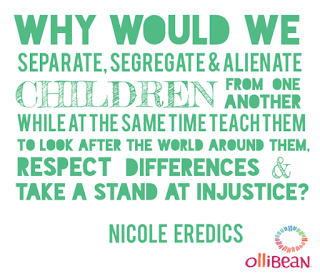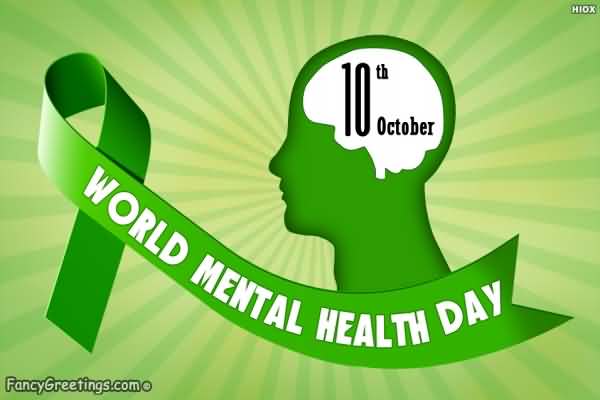Something that I am passionate about is inclusive education, due to my youngest daughter having Down syndrome. These two words, 'inclusive education' though are often misused and there is a lot of confusion over what they actually mean. So, it is my intention with this blog post, to set things straight.
What is inclusive education?
1) First of all I am talking about students with disabilities being in mainstream schools. Being in a special school is not inclusive education.
2) Students are in the classroom with the other students,and for the same amount of time as the other students. They are provided with the supports they need to access the same activities that the other students do. Their school work is modified if necessary and if so, they are doing the same work as their peers but at their level. They do not have a teacher aide shadowing them.
This is a succinct definition:
Inclusion is being physically present and fully participating in the same classroom as peers for the same proportion of time; socially belonging and immersed in the same curriculum.
It requires the provision of necessary supports and adjustments so the student can learn, contribute and participate socially alongside one’s peers.
Students are under the same school and class rules, although it needs to be stressed that it may take more time and attention to teach some children these rules.
Inclusive education is not:
* Special classes
* A full-time teacher aide
* Being isolated in the classroom
* The student is working in parallel rather than the curriculum being modified
* Being included in class but not in the life of the school (playground, excursions, camps, extra-curricular)
* Being enrolled but not challenged to learn, participate and contribute
Let's look at the following diagram:
Exclusion: Students with disabilities are in separate schools.
Segregation: Students with disabilities are in a mainstream school but are kept in separate units away from the rest of the students.
Integration: Students with disabilities are in mainstream schools, in classrooms but are expected to do the same work as the other children even if they are not able to, they do not have any supports, and they may be excluded or separated from the other students for some activities.
Inclusion: What we want!
Why do we want inclusion for children with disabilities?
1) All children are learners and all children are unique. What is ‘normal’?
2) School is the gateway to society and inclusive communities start with inclusive neighbourhood schools that value diversity and respect the right of all students to be welcomed and to belong.
3) Inclusion means going to school with siblings. It’s about having an ordinary life.
4) Regular schools offer a wide range of experiences.
5) Inclusion is a RIGHT:
* Article 24 of the United Nations Convention of the Rights of Persons with Disabilities recognises the right to an inclusive education as a human right of people with disability.
* In Australia, the Disability Discrimination Act 1992 and the Disability Standards for Education 2005 ensure equal access for people with a disability to education.
* The Australian Professional Standards for Teachers 1.5 & 1.6 give the instructions that teachers must differentiate teaching to meet the specific learning needs of students across the full range of abilities.
What research is there on inclusive education?
The case for inclusive education over ‘special education’ models (special schools or education support units), is overwhelming. Over 40 years of research, and hundreds of studies have compared education outcomes for students with a disability in segregated special education settings to regular education environments. They have all ruled in favour of inclusive schools. The benefits continue into secondary education.
In Australia, Dr Bob Jackson has done a lot of research into the benefits of inclusive education for children with disabilities.
This diagram shows two pathways. The horizonal is the life of a child who goes to mainstream school and progresses on with a regular ordinary life. The diagonal line shows the direction life takes for many students who go through special education.
Research has also shown that inclusion leads to:
* Greater access to the general education curriculum
* More time ‘on task’ and a greater motivation to learn
* Greater progress academically, particularly with literacy skills
* Increased communication skills
* Improved social skills and behaviour
* More friendships
* A change in the school culture to a more inclusive one to the benefit of a great many students, not just those with a disability.
But what about the effects on non-disabled students and their learning?
* This is a common argument used by many to stop children with disabilities from being in the classroom. But this is a poor argument as the research has shown that inclusion is better for ALL students. Having disabled children in a school, develops more positive attitudes towards difference, better social skills and awareness, more caring friendships, less disruptive behaviour and more developed personal values and ethics. All students in the school learn the skills they need to live full lives as part of their communities, and to build the communities of the future.
* Disabled peers do not take away from teacher instruction time and there is no detrimental effect on the achievement of the child’s peers. Many studies have shown a positive impact due to peer tutoring. The behaviour of the other students is unaffected, and differentiation of the curriculum leads to better teaching for the whole class and more effective classroom management strategies.
It's about the mindset of educators
One of the excuses I received from a teacher not wanting my daughter in her class was, there would be too much preparation and she didn't have the time. This turned out to be false and later in the year, this particular teacher changed her mindset towards inclusion and actually embraced it. I like the following meme as it gives great examples of how teachers can look at the children with disabilities who are in their class.
Advice for Parents
Parents who have children with significant disabilities and are wanting their child to have an inclusive education will more than likely face gatekeepers, barriers, low expectations and prejudices along the way. Even though it is a right, there are many in the education system who do not believe that children with disabilities should be in mainstream school. I have encountered some myself in my journey, and I've had to be an assertive advocate for my daughter. I've also had to maintain my vision for my daughter, and check in often with her teacher to ascertain whether we are still on track. Often schools can seem like secret societies. My advice is to be prepared that challenges will arise at some stage, and gather people around you who can support you.
My daughter is just about to finish her primary school experience and start her journey through high school. I have my vision for her firmly implanted in my mind and in the next little while will be imparting it to her new school. And of course it is the school where her brother and sister go to.
***
For more articles on difference and diversity you can find me on Facebook at:
https://www.facebook.com/JennyWoolseyAuthor/













